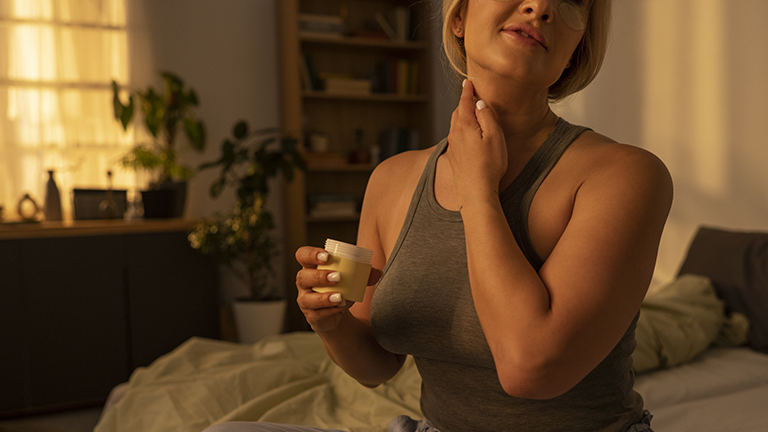Table of Contents
[INSERT_ELEMENTOR id=”5755″]
Introduction
Menopause is a natural stage in a woman’s life, typically occurring between ages 45 and 55. One of the most challenging symptoms is menopause night sweats, often accompanied by hot flashes, sleep disturbances, and discomfort. Many women seek natural solutions to manage these symptoms without relying on hormonal therapy. Herbal supplements have emerged as a safe and effective alternative, offering relief and supporting hormonal balance naturally. This guide explores the best herbal options, lifestyle strategies, and scientific evidence to help you navigate menopause night sweats.
Why Herbal Supplements Can Help
How Natural Remedies Work for Menopause
Herbal supplements contain bioactive compounds such as phytoestrogens, flavonoids, and adaptogens, which interact with the body to help stabilize hormone levels and reduce symptoms. Unlike hormone replacement therapy (HRT), these natural remedies often have fewer side effects and support overall wellness. Key benefits include:
- Reducing frequency and intensity of hot flashes and night sweats.
- Promoting better sleep quality.
- Supporting emotional balance and stress reduction.
- Providing additional health benefits such as antioxidant and anti-inflammatory properties.
Non-Hormonal Approaches to Night Sweats
Many herbal remedies provide non-hormonal pathways to symptom relief, making them ideal for women who cannot or prefer not to use HRT. By supporting the endocrine system and autonomic regulation, herbs can naturally ease menopause night sweats while promoting overall well-being.
Top Herbal Supplements for Menopause Night Sweats
Black Cohosh: Benefits and Safety
Black cohosh (Actaea racemosa) is one of the most researched herbs for menopausal symptoms. Clinical studies indicate it may reduce hot flashes and night sweats by modulating serotonin receptors and supporting hormonal balance. Source
Usage: Standardised extracts (20-40 mg/day) for up to 6 months are considered safe for most women.
Red Clover: Phytoestrogens for Hot Flashes
Red clover (Trifolium pratense) contains isoflavones, plant-based compounds that mimic estrogen and may reduce the severity of hot flashes and night sweats. Studies suggest it is effective in mild to moderate menopause symptoms. Source
Usage: 40-80 mg/day of standardized isoflavone extract is typical, but results vary.
Sage: Reducing Night Sweats Naturally
Sage (Salvia officinalis) is traditionally used to control sweating and improve cognitive function. Research indicates it may reduce excessive sweating during menopause. Source
Usage: Herbal teas, tinctures, or 300-500 mg/day of dried extract.
Dong Quai: Traditional Uses and Modern Insights
Dong quai (Angelica sinensis) is a traditional Chinese herb used to support female reproductive health. While evidence for hot flashes is limited, it may improve overall hormonal balance and circulation. Source
Usage: 500-1000 mg/day of standardised extract.
Evening Primrose Oil: Supporting Hormonal Balance
Evening primrose oil contains gamma-linolenic acid (GLA), which may help with hot flashes, mood swings, and skin dryness during menopause. Some studies suggest modest benefits for symptom relief. Source
Usage: 500-1000 mg twice daily.
Ashwagandha: Adaptogen for Stress and Sleep
Ashwagandha (Withania somnifera) is an adaptogen that helps the body manage stress and supports sleep, which can indirectly reduce night sweats. Source
Usage: 300-600 mg/day of standardised root extract.
Licorice Root: Balancing Hormones Naturally
Licorice root (Glycyrrhiza glabra) may mimic mild estrogen effects and support adrenal function, helping reduce hot flashes. Caution is needed for those with high blood pressure. Source
Usage: 250-500 mg/day of extract; limit long-term use.
Chasteberry (Vitex): Supporting Mood and Menstrual Cycles
Chasteberry (Vitex agnus-castus) helps regulate hormones and improve mood swings during perimenopause and menopause. It may also reduce the frequency of night sweats in some women. Source
Usage: 20-40 mg/day of standardised extract.
[INSERT_ELEMENTOR id=”5738″]
How to Use Herbal Supplements Safely
Recommended Dosages and Forms
Herbal supplements are available in teas, capsules, tinctures, and powders. Following recommended dosages ensures effectiveness and minimises risks. Always start with the lowest effective dose and monitor your response.
Potential Side Effects and Interactions
- Black cohosh may cause mild stomach upset or headache.
- Red clover may interact with blood thinners.
- Licorice can raise blood pressure in sensitive individuals.
- Always consult a healthcare provider before combining herbs with prescription medications.
Consulting Your Healthcare Provider
Women with liver conditions, hormone-sensitive cancers, or chronic illnesses should seek medical guidance before starting herbal supplements. A qualified provider can recommend the safest and most effective approach tailored to individual needs.
Lifestyle Tips to Reduce Night Sweats
Diet Adjustments
- Limit caffeine, alcohol, and spicy foods.
- Eat phytoestrogen-rich foods like soy, flaxseed, and legumes.
- Maintain hydration to regulate body temperature.
Sleep Hygiene and Cooling Techniques
- Keep the bedroom cool and ventilated.
- Use moisture-wicking sleepwear and bedding.
- Practice relaxation techniques before bed (deep breathing, meditation).
Exercise and Stress Management
Regular exercise supports hormonal balance, improves sleep quality, and reduces stress, indirectly alleviating night sweats. Activities like yoga, walking, and strength training are beneficial.
Combining Supplements with Other Natural Remedies
Herbal Teas and Infusions
Herbal teas with sage, chamomile, or peppermint can soothe the nervous system and reduce sweating at night.
Aromatherapy and Relaxation Techniques
Essential oils like lavender or clary sage used in diffusers or baths may promote relaxation and improve sleep quality.
Expert Opinions and Research Insights
Several studies and clinical trials support the use of herbal supplements for menopause symptom relief. According to the North American Menopause Society (NAMS), black cohosh and red clover show moderate evidence for reducing hot flashes. Integrating herbs with lifestyle strategies can enhance effectiveness and ensure safety. NAMS Expert Articles
Conclusion
Managing menopause night sweats naturally is possible through a combination of safe herbal supplements, lifestyle adjustments, and expert guidance. Black cohosh, red clover, sage, and adaptogenic herbs like ashwagandha offer promising relief. When used responsibly and combined with healthy habits, these natural solutions can significantly improve comfort, sleep, and overall quality of life during menopause.

